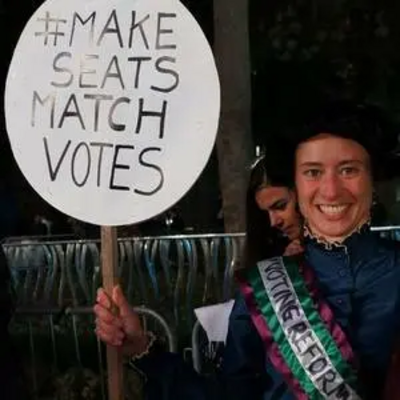Countries with PR are more successful at reducing carbon emissions than majoritarian countries

System Change Not Climate Change
There is a growing sense that the current political system in the UK is not fit for purpose. Many newspapers have written about the broken system and the lack of accountability in Westminster to the demands of the citizens. This flawed democracy has an impact on many areas, including how we deal with the climate emergency as a country.
With a Conservative government in power in the UK, which has been assessed as the party with the least climate friendly policies, the lack of action on climate in the UK is perhaps not a surprise. Some of you may already be aware that the Conservatives won 56.2% of seats in parliament in the general election in 2019 while only winning 43.6% of the votes cast due to the current electoral system, First Past the Post (FPTP). Smaller parties like the Green party would have gained around 17 seats in a proportional system, but in the FPTP system they gained just 1 seat.
People are looking increasingly to countries that have PR for climate leadership, for example Denmark, Germany and New Zealand, and it is becoming clear that these countries are better at dealing with complex emergencies due to the way their systems encourage consensus-building and collaboration. There is already evidence that countries with PR are more successful at reducing carbon emissions than majoritarian countries (e.g. UK and US) and that the use of renewable energy is also significantly higher in countries with PR.4
As I pointed out in the Independent last year, it's notable that the amazing work of Extinction Rebellion has taken off in a much bigger way in the countries with First Past the Post than in our proportional neighbours. In most European democracies, fighting parliamentary elections can itself be a pretty effective way of winning better environmental policies. Yet with our unrepresentative system, huge numbers of people are forced to risk arrest just to make their voices heard - because even when millions vote for candidates promising climate action they can find themselves silenced by FPTP.
The frailties of our system in the face of urgent crises has also been shown in the response to Covid-19, where two major countries with FPTP (again the UK and US) have done exceptionally poorly. Academic research has already emerged suggesting that majoritarian democracies have been significantly less effective in responding to this emergency. Looking around the world, it seems to be countries with winner-takes-all systems that have dithered and delayed, while those with PR have delivered the kind of 'strong, decisive' government that advocates of First Past the Post claim it alone can deliver. Tired preconceptions about our outdated voting system may turn out to be one of the many things that this pandemic changes forever.
So where does this leave the UK voter who wants urgent action on the climate emergency? Many people who want to vote for the Green Party or Liberal Democrats are likely to either vote tactically for a party they don't really agree with or not vote at all given their vote often doesn't make a difference in the current system.
However, there is a real sense that people want to change the system - and it's getting more palpable with every year that goes by. The proportion of those dissatisfied with democracy in the UK reached an all-time high in 2019 at 61%. The big question is how we seize this moment and ensure that we get a proper democratic system that will benefit this country for generations.
Firstly, we have built a cross-party alliance which is actively campaigning for PR. Secondly, one of the two major parties will need to support PR which is likely to be Labour - and we are working with Labour Campaign for Electoral Reform and others to mobilise the overwhelming support for PR among the membership to push for a change in policy. Thirdly, we are building a grassroots movement with volunteers from all parties and none to campaign for PR.
What can I do to help the cause? At Make Votes Matter, we know we need a strong, grassroots movement if we're to win Proportional Representation. If you want to get deeply involved, we're alway looking for committed volunteers who can play key roles in the campaign.
But we also know that many of our supporters are members of several pressure groups or parties and may not have time to campaign for PR year round. So, we organise several major action days each year where we give all our supporters everything they need to come together and campaign for real democracy.
However you'd like to be involved, if you believe we need equal votes, it all starts with joining the movement.
Source 1:
https://www.carbonbrief.org/election-2019-what-the-manifestos-say-on-energy-and-climate-change
Source 2:
Source 3:
https://www.bbc.co.uk/news/education-51281722
Source 4: Photograph: https://unlockdemocracy.org.uk/blog-1/our-political-system-isnt-responding-to-the-climate-crisis
Klina Jordan
Green Liberal Democrats and Make Votes Matter hosted a joint event on 22nd June during the Green Liberal Democrats conference which looked at the effect of the electoral system on the way the climate emergency is dealt with. We have asked the two main speakers, Klina Jordan, co-founder of Make Votes Matter, and Wendy Chamberlain MP, Liberal Democrat spokesperson for Political & Constitutional Reform, to summarise the key points discussed at the event.
